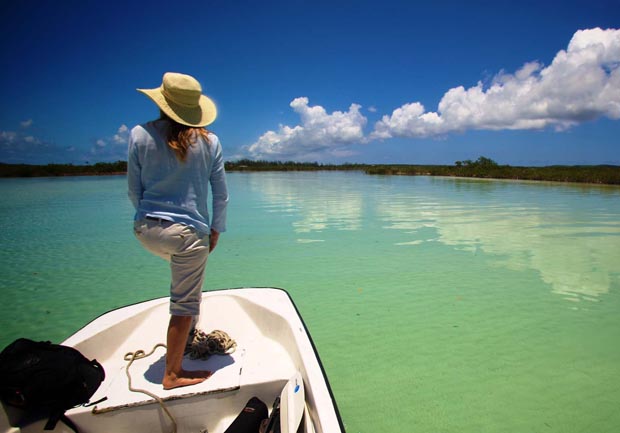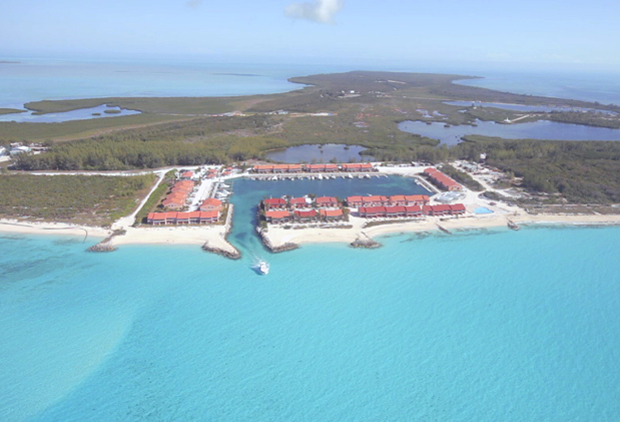Some of the best bone fishing is in the Bahamas, but taking your boat there requires detailed planning
by Tom Neale / BoatUS / with comments by FLM.com editorial staff
[dropcap]T[/dropcap]he western islands of the Bahamas are only 50 miles from Florida’s east coast. With a bit of prep and planning, you can get there even in a modest sized boat.
Special Considerations
- Seamanship:
Bahamian inlets and cuts between islands are often unmarked, and challenging if there’s an onshore swell. Be sure of your navigation and boat-handling skills before you go.
- Economy:
Confirm status of marinas you plan to visit. Bring cash – some out island establishments don’t accept credit cards.
- Fuel Stops:
In the Bahamas they aren’t always reliable, and can sometimes run out of fuel. It’s critical to keep a good reserve in your tanks. Be sure your boat has a high-quality particle/water fuel filter such as those by Racor. We often pre-filter fuel with a Racor RFF15 C (15-gpm funnel) that separates out water and particulate.
- Navigation:
This is a natural wilderness, so many areas have no aids to navigation, or have aids that are off station or aren’t working. Learning how to read the water is important. Study the guidebooks, and stay alert. You can see the bottom, sometimes more than 25 feet down, from your boat. Keep a water watch; don’t rely exclusively on chartplotters or charts when negotiating cuts or inlets through reef or sand shoals and be sure to plan the time for these passages when the light is overhead or behind you so you won’t be blinded, and so what’s underwater reveals itself; a good pair of polarized sunglasses is invaluable.
- Insurance:
Many insurance carriers exclude the Bahamas from their normal navigational limits but will include them for additional premium. BoatUS Insurance allows you to add areas when needed, on a pro-rata basis. With unlimited towing, you can get TowBoatUS assistance from southern Florida up to 130 miles offshore, well beyond the western Bahamas destinations.
- Spares:
If something breaks, it may be difficult to get another part or a repair, especially in the more remote areas. Spares for critical components and systems, to the extent that you can carry them practically, are important. These might include a water pump for your fresh-water system, a starter and alternator, spare engine oil, belts, gasket material, and temporary repair products such as Rescue Tape.
- Bahamas Customs and Immigration:
There are fees for entry to the Bahamas – $150 for vessels up to 30-feet and $300 for vessels larger than 30-feet. Fishing license and departure tax for four people are included in the fee. You’ll be asked to declare your stores and general itinerary. Your boat may be boarded and inspected. If you have weapons, declare every one and every round. Laws and procedures sometimes change. Click here for current information . . . before you go.
- U.S. Customs:
It’s mandatory to follow U.S. Customs reporting procedures when returning. Check for the latest regulations before you go. If your boat is more than 30 feet order a U.S. Customs User Fee decal for your boat before you go so you won’t have to get it upon return.
- Drinking Water:
In many areas such as the Exumas, potable water is scarce and costs up to $1 per gallon or more at the dock. Marinas with good reverse-osmosis facilities are a plus. Water is more plentiful in other areas, such as the Hub of The Abacos.
- Fishing:
When you clear Bahamas customs, you can apply for fishing licenses. Check the latest rules before you go . . .
- Your Health:
Scrapes or cuts from certain types of coral, conch, barnacles, and other creatures can cause infections, and medical assistance and supplies can be scarce in less populated areas. Be careful, and don’t expect to find medical facilities like those back home in the outlying areas. Have a good medical kit. Consult with your doctor before you go as to what you should take to meet any special needs. Take all your needed prescription medicines in their labeled prescription bottles.
Tom Neale is a contributing editor and a key member of our BoatUS “Ask The Experts” tech team. He and his wife Mel and their two daughters lived aboard and cruised the Bahamas for almost two decades.
To read complete story click here . . .



